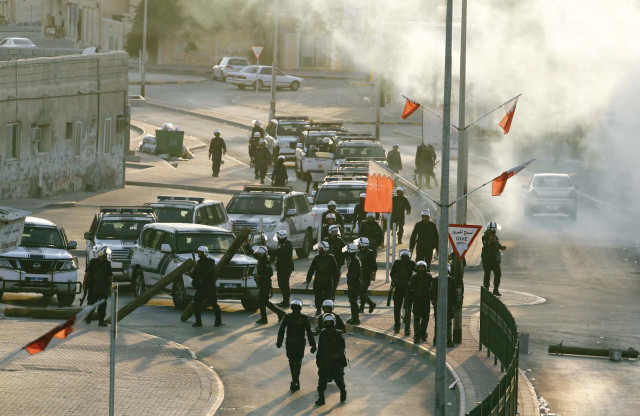Bahrain commission report: Expats subjected to ‘physical, psychological torture’
Independent panel catalogues protester deaths in custody in 489-page account.

Around 8,110 complaints and statements of various human rights abuses were received, and a “systematic practice of physical and psychological mistreatment” was uncovered when the Bahrain Independent Commission of Inquiry (BICI) began an investigation in July into protests that took place in the Gulf Kingdom earlier this year.
A report released by the BICI on Wednesday provides an extensive overview into the gruesome riots.
The 489-page account also mentions the methods employed by security personnel, including Pakistanis, in Bahrain, and the violence targeted toward expatriate workers. The extensive report notes that a large number of security personnel in Bahrain are from Iraq, Jordan, Pakistan and Yemen.
The role of Pakistani-origin security forces in the violent crackdown against protesters in Bahrain was initially reported by The Express Tribune in March, as it was revealed that the Fauji Foundation’s Overseas Employment Services was recruiting Pakistani ex-servicemen to serve in Bahrain’s security forces. A former military officer is also reportedly involved in headhunting for the same purpose.
The Foreign Office spokesperson said at the time that “these Pakistanis are not being sent by the government of Pakistan. They are employed in Bahrain in their individual capacity”.
Security forces subject protesters to torture
The BICI report investigates the deaths of protesters while they were in Bahraini custody. In the case of Zakariya Rashid Hassan al Asheri, investigators found that he had died as a result of torture. The interior ministry claimed he had “sickle cell anemia”, which Asheri’s family said he did not have.
A fellow detainee told the commission that Asheri was beaten up by security forces.
“The witness stated that all the detainees in the same cell were blindfolded and handcuffed, and forced to lie on their stomachs. On one of the mornings, the deceased began to experience hallucinations or confusion, whereby he began banging on the door shouting his name. The prison guards shouted at him to be quiet and when he did not comply, they entered his cell. The witness heard the deceased being beaten and he heard him scream after each beating. The witness then heard a shuffling noise after which the deceased’s shouts became muffled. The witness then heard a Pakistani say in Urdu, ‘He is dead’.”
Another detainee, who was arrested in April, said that he was routinely beaten and insulted by the prison guards of Pakistani origin. One, who was beaten up and sexually molested in custody, was transferred to a jail run by Pakistani officers where he was “forced to stand for prolonged periods, had limited access to a toilet and was subjected to routine beatings up to three times per day”.
Targeting Pakistanis
The report also highlights that expatriate workers were attacked because many protesters believed they were part of the security forces. On March 3, violence was reported in the vicinity of the Pakistani embassy in Manama. But it was on March 13, termed an “important turning point in the sequence of events in Bahrain”, that there was an increase in attacks against Pakistanis and other expatriate workers.
Quoting investigations by the interior ministry and reports by Pakistan’s foreign ministry, the commission’s report states that one Pakistani man was beaten to death, another later succumbed to his injuries and a third was “violently assaulted” while residences where Pakistanis lived also came under attack.
Published in The Express Tribune, November 26th, 2011.



















COMMENTS
Comments are moderated and generally will be posted if they are on-topic and not abusive.
For more information, please see our Comments FAQ